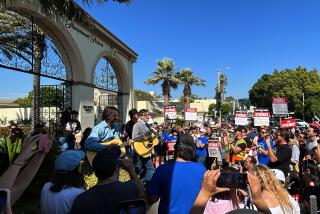Web DJs silenced by royalty fees
- Share via
WASHINGTON — Every day was Christmas for Michael Clark, but now the holiday’s over.
From the attic of his condo in Woodbridge, Va., the 38-year-old Web developer ran an Internet radio station that spun his beloved Christmas carols all year long. Then in March, a panel of federal judges sharply increased the royalty charges for playing music online.
Since then, it’s been one long, silent night for Clark and his hundreds of listeners at christmasmusic247.com. His site and hundreds of other free Internet radio stations already have shut down. Most others say they will stop when the rates kick in Sunday.
“It really isn’t fair,” said Clark, who pulled the plug when he realized he could owe more than $20,000 in royalties if he continued.
The decision threatens the diversity that webcasters bring to an era of large radio conglomerates and homogenized Top 40 playlists on many over-the-air stations. Each month an estimated 72 million listeners tune in to thousands of Internet radio stations programmed by devotees of every musical genre and subgenre.
Those stations often feature programming that’s like a party mix that can be shared with the world, including obscure and independent recordings never heard on the FM or even satellite airwaves. “I can’t shoot up a satellite, I can’t put up a tower,” Clark said. “It seems like you need these niche broadcasters.”
Clark and other Internet radio providers stopped their music streams to avoid racking up more obligations after the Copyright Royalty Board set the new rates March 2. Clark and others said they would resurrect their stations if Congress or the courts halted the controversial hike, which by 2010 will more than double the current rate of .0762 of a cent each time a song is played.
The royalty board also removed a provision that capped royalties for small Internet radio stations at 10% to 12% of their revenue. The higher rate is retroactive to the start of 2006, so webcasters also face large lump-sum payments.
SoundExchange, the organization that collects and distributes Internet music royalties, said the new rates were fair and necessary to compensate performers and record companies for the use of their music. Negotiations are continuing between webcasters and SoundExchange, which has the ability to strike separate deals.
In the meantime, the Internet is losing some of its musical variety. Webcasters say the preemptive shutdowns are just a taste of what would happen if the rate hike becomes permanent.
“I miss it,” said Glenn Wilcox, a manufacturing engineer and amateur trumpet player in San Diego who started JazzPlayerRadio.com with three friends in 2004. The station played nothing but trumpet jazz by legends such as Maynard Ferguson and Bobby Shew as well as local artists, but Wilcox and his friends stopped April 30 because of the pending royalty increase.
“If I went to a show or a get-together of guys who are my heroes, because I’m part of JazzPlayerRadio, I could walk up to one of them, like Bobby Shew, and shake their hand,” said Wilcox, 45. “He knew the station.”
Despite the thrill of having hundreds or even thousands of listeners around the world enjoying their favorite music, small webcasters have decided the higher costs make it a luxury they can’t afford.
Most Internet radio stations are free for listeners. Some large sites, such as Yahoo Music, run advertisements to help offset the costs, but most people who operate small stations simply foot the bill.
“I pay for this out of my own back pocket,” said Dick Shuey, 68, of Holladay, Tenn. He spends about $350 a month to run his country music station, TwangTownUSA.com., but will stop Sunday because of the higher fees.
Many hobbyists use services such as Live365.com or LoudCity.net to broadcast their stations for a flat monthly fee as low as $9.95. Live365 has lost about 300 of its 10,000 stations since the royalty increase was announced in April, said Johnie Floater, the site’s general manager of media. And about 250 stations are starting each month, down from about 350 before the rate hike.
At LoudCity, the number of Internet stations has dropped from 550 to about 500 even though the company, and not the broadcaster, is responsible for royalty payments under its monthly service plans, which range from $35 to $200, co-founder Brandon Casci said.
“They’re worried that somehow, someway, SoundExchange is going to come after them,” Casci said.
Clark started his Christmas-music station because he had always loved the genre and enjoyed working at his college radio station. He built his collection by scooping up CDs at after-Christmas sales. His playlist totaled 2,959 songs from the likes of Peabo Bryson, Bing Crosby, Garth Brooks and the Brady Bunch.
Interest in his station built throughout the year, from about 10 to 20 listeners in January to big spikes after Labor Day and Halloween. In December, he averaged 625 listeners during the workday, with many people listening in their offices. Fan e-mail has arrived from as far away as Japan and Africa.
But after doing the math, he decided he couldn’t survive under the new rates.
Clark offset his costs last year with $1,076 from advertising and listener contributions. Under the higher royalty rate, Clark estimated he owed $7,471 for 2006.
Based on feedback from listeners, he had started a second station on his site this year devoted to instrumental Christmas music. By his calculations, he would owe $13,410 for both stations this year.
“That’s a car payment or the second mortgage,” Clark said. “That’s just not realistic.”
--
More to Read
The biggest entertainment stories
Get our big stories about Hollywood, film, television, music, arts, culture and more right in your inbox as soon as they publish.
You may occasionally receive promotional content from the Los Angeles Times.











